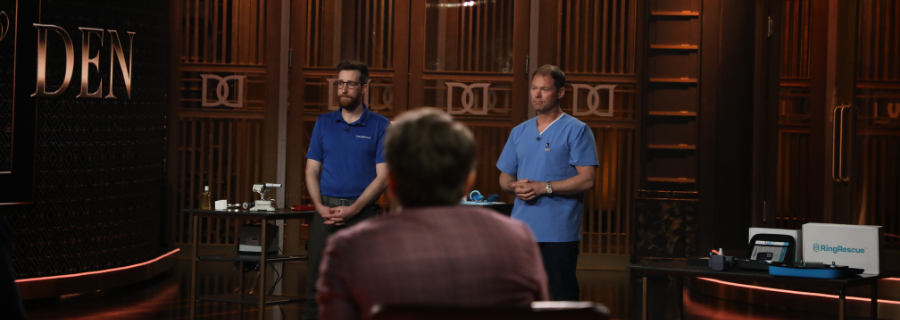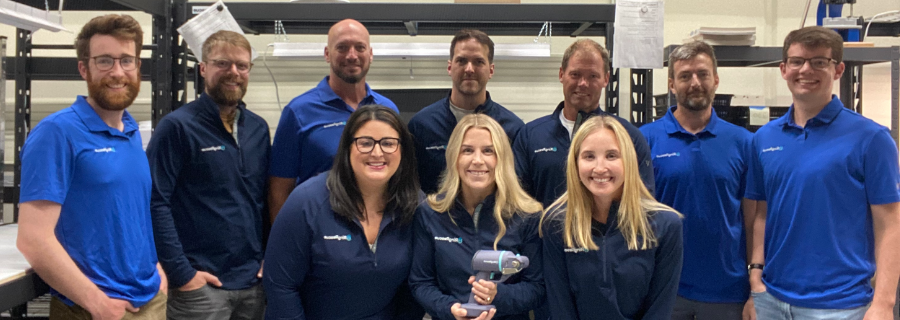Have you ever visited a local hospital and had a power tool from the local hardware store used in your medical procedure? Hardware in healthcare doesn’t sound appealing, and yet it’s a common treatment option for folks who find themselves with a ring stuck on their finger.
“Electric power tools from a hardware store are often used for difficult stuck ring removals that have failed other attempts,” says Dr. Kevin Spencer, an Emergency Department doctor at Dartmouth General Hospital. “Rotary grinders spin at high speeds and can rapidly generate heat that can easily cause severe finger burns within seconds if extreme care is not taken. One misstep with those kinds of tools can cause serious injury, and the sparks they eject into the air can pose an eye injury risk as well.”
“There are also multiple providers needed for lengthy periods to complete a difficult ring cut with those tools,” adds Spencer. “One person tries to protect the finger, one person applies cooling water to try and mitigate burn risk, and another person is using the rotary grinder, so there's a crowd of people around the patient trying to use a non-medical device hardware store tool. It’s an unsophisticated, resource intensive and risk prone medical procedure that needs to be changed.”
Spencer, along with co-founders Brad MacKeil and Patrick Hennessey, are helping to make that change happen at Ring Rescue.
Familiar problem, innovative devices
Ring Rescue was founded in 2018 to tackle the problem of stuck rings. MacKeil, Co-Founder and Lead Operations Engineer explains that he and Hennessey were in the engineering program together at Dalhousie and approaching their final year in 2016. The pair were brainstorming for their final engineering Capstone project.
“We were throwing ideas around, and the idea of a compression device to reduce swelling in a finger to help facilitate ring removal bubbled to the top,” MacKeil says. “We pitched it to Dalhousie, and they took a chance on us — they let us form a group to pursue the project later in that year.” In the spring of 2017, MacKeil and Hennessey presented the device at the Capstone project showcase, where Spencer was a judge. “He saw the project, and a few months later he reached out and we started talking about what is now Ring Rescue,” says MacKeil.
Hennessey, Co-Founder and Chief Technical Engineer, adds that since the Capstone project, the team commercialized the compression device as a medical device and has sold over 1,600 units. More development was in store, however. “Our customers also expressed a desire for a better ring cutter,” says Hennessey. “There are cases where you simply cannot compress a finger to remove a ring, as is the case with significant finger injury or arthritic bone growth. So, we embarked on a two-year research and development project to develop what is now known as the Dolphin Ring Cutter.”
While the Compression Device provides a non-destructive option that shrinks the finger to help remove the ring, the Dolphin Ring Cutter cuts any ring metal, quickly and safely. Hennessey explains that there are three important innovations in their ring cutter: the cutting discs that use a special abrasive, the minimization of heat generation through a computer-driven feedback loop, and the user-friendly design. “It is, in our view, the best ring cutter in the world, and it is also the only apparent electric ring cutter registered as a medical device with the FDA,” says Hennessey. “We have just started shipping that in September of this year. It's the second medical device that we have commercialized and we're really proud of that.”

“It takes a village”
It becomes clear when interviewing all three co-founders together that Ring Rescue is based on a culture of collaboration and problem-solving. “For me, the medical device space — and having a start-up in this space —offers a great intersection between business, engineering, and solving problems for people,” says MacKeil.
Halifax has also been the ideal place to set up shop for the Ring Rescue team. “There's a common point for start-ups where you have to decide whether to stay or go, but the ecosystem here is great,” says MacKeil. “We found everything we need to be successful in Halifax. We really want to highlight that you can do big business here — you can have great ideas here and you don't need to leave.”
Hennessey adds that Halifax is not only home to the trio, it’s also the place where Ring Rescue has been able to flourish. “We've grown our team from the three of us working in Kevin’s basement to a team of ten, full-time, very talented people,” he says. “That's something that I'm super proud of. We have a phenomenal team here.”
Spencer adds that the local start-up infrastructure has been key to Ring Rescue’s success, alongside a formidable list of supporters. “The list of people that have helped us is huge,” he says. “It truly is. I mean it takes a village, and there is a strong village here that has helped us and is willing to help others get involved in the medical startup space. It's an exciting field, and it’s growing.”
The cutthroat myth
Headlines from Silicon Valley may give the perception that tech startups operate in cruel and ambitious environments. But all three Ring Rescue co-founders emphasize how positive their experiences have been.
“The cutthroat start-up climate has not been in our experience,” says Spencer. “When we talk to international companies — big medical device companies with massive brands — they're collaborative. They'll pick up the phone and talk to us. It's quite incredible. The medical device field is a big industry, but it feels smaller than you would expect and truly, the big players are generally interested in you and want to see you succeed.”
MacKeil adds that the local start-up community is just as supportive as the big companies. “We've done collaborative work with a lot of people in the local startup community. You just have to find the right people and just ask questions. Don't be afraid to reach out. Everybody wants to help around here — which is great about Atlantic Canada in general!”
Spencer adds a list of thanks to everyone who has supported Ring Rescue, including the National Research Council of Canada Industrial Research Assistance Program, Atlantic Canada Opportunities Agency, Dalhousie University, Halifax Chamber of Commerce, Creative Destruction Lab, Dartmouth General Hospital, IWK, and the Ring Rescue Board of Directors. “There's a lot of people with incredible backgrounds that have all stepped up to help us achieve our goals of truly changing the standard of care worldwide for this problem, and we couldn't do it without them.”
Learn more about Ring Rescue at:
< Back to Articles | Topics: Member Profile

